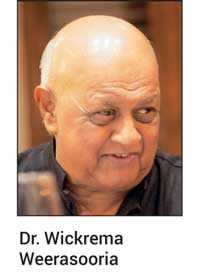Wednesday Feb 18, 2026
Wednesday Feb 18, 2026
Thursday, 6 December 2018 00:19 - - {{hitsCtrl.values.hits}}
By Rohan Pethiyagoda
Sri Lanka is poorer for the passing of Dr. Wickrema Sena Weerasooriya last Tuesday. There were so many aspects to his life, and he was so many things to so many people, that it is difficult to know where to begin. Most Sri Lankans who can yet recall the J. R. Jayewardene presidency remember Wickrema as the all-powerful secretary to the Ministry of Plan Implementation, one of the few Ministries of which the President was the subject Minister. Wholly trusted by J.R.J., Wickrema ran his Ministry in effect as Chief Executive, simply keeping the President informed of the more important goings on. The Ministry’s mandate was all-encompassing, and he wielded the power of his office with an effectiveness that has not since seen parallel. Things simply got done, and as was the need of the times, his focus was largely in rural development and healthcare, from family planning to child nutrition. 
Wickrema earned his stripes in the Jayewardene administration through his signal contribution to the election campaign of 1977 – of which he was the architect – when the UNP came in from behind to secure a five-sixths majority in Parliament, entrenching the party in office for almost 20 years. His father, the celebrated Queen’s Counsel N. E. Weerasooriya, had been a close friend and associate of J. R. Jayewardene, which led in turn to the President affectionately treating the youthful Wickrema as his protégé. And so skilful was Wickrema in delivering one electoral victory after another that many forgot that he was, if you peeled away his political exterior, an eminent legal luminary in his own right.
Born in 1939 and having schooled at Royal College, Wickrema went on to secure his LL.B. from the University of Ceylon, leading his batch with first-class honours. After being called to the bar, he took to practising law while lecturing, first at Peradeniya and then at Vidyodaya. It was while at the former that he met Rohini Dissanayake, a student at Peradeniya, who shortly thereafter became his wife. She herself was the daughter of Andrew Dissanayake and the sister of Gamini Dissanayake, at that time a fledgling opposition MP who would go on to become one of the most outstanding Ministers of the Jayewardene Government and leader of the Opposition, meeting his untimely death aged just 52 at the hands of the LTTE while contesting Chandrika Kumaratunga for the Presidency in 1992.
Having obtained his Ph.D. from the London School of Economics in 1972, Wickrema took up an appointment as a lecturer in banking law at Monash University, returning to Sri Lanka to engage in the overthrow of the Sirimavo Bandaranaike Government in 1977. Having served a decade as a Permanent Secretary, he was made High Commissioner in Canberra in 1986, in which post he served until 1990, when he returned to Monash as an Associate Professor of Law, serving also as Director of the Banking Law Centre established by the National Australia Bank.
Wickrema devoted much of his time to charity – especially in support of the blind. His specialisation was in the law of banking, a subject on which he was to author several scholarly textbooks, both in Sri Lanka and in Australia. In retirement, he continued with lectures in this discipline to would-be bankers, accountants and managers. The access to young minds teaching gave him was something he continued to relish right up to his death. Meanwhile, he also served at Insurance Ombudsman and an active member of the University Grants Commission.
He was impish to the end, and chuckled as he told me only two weeks ago that he had had to wait until he was almost 80 years old to be fired from a job for the first time: as advisor to President Maithripala Sirisena, a post to which he had been appointed in early 2015. “The fellow didn’t even have the guts to tell me to my face,” said Wickrema, waving the noxious missive at me. “He just sent me a letter of termination. And this was the same joker who only four years ago used to hang around here asking for tips on how to win elections.”
Wickrema never knew how to relax. There was always a queue outside his study at home, which was an unholy mess, cluttered with books, papers, notes and assorted memorabilia. From there he directed operations, calling on his extensive network of contacts to help solve the problems that were brought to his desk. People came to him because they knew he could get things done. From these duties he could be dragged away only by his three grandchildren, of whom he could never have enough. His last words were “Where’s Ayaan?” – his oldest grandson.
To pigeonhole Wickrema as a public servant, a diplomat, a lawyer, a philanthropist, or an academic would be to miss the spirit of this astonishingly versatile man. His was an extraordinary humanity, finely blended with just the right amount of mischief to always keep one on one’s toes. They don’t make them like him anymore.